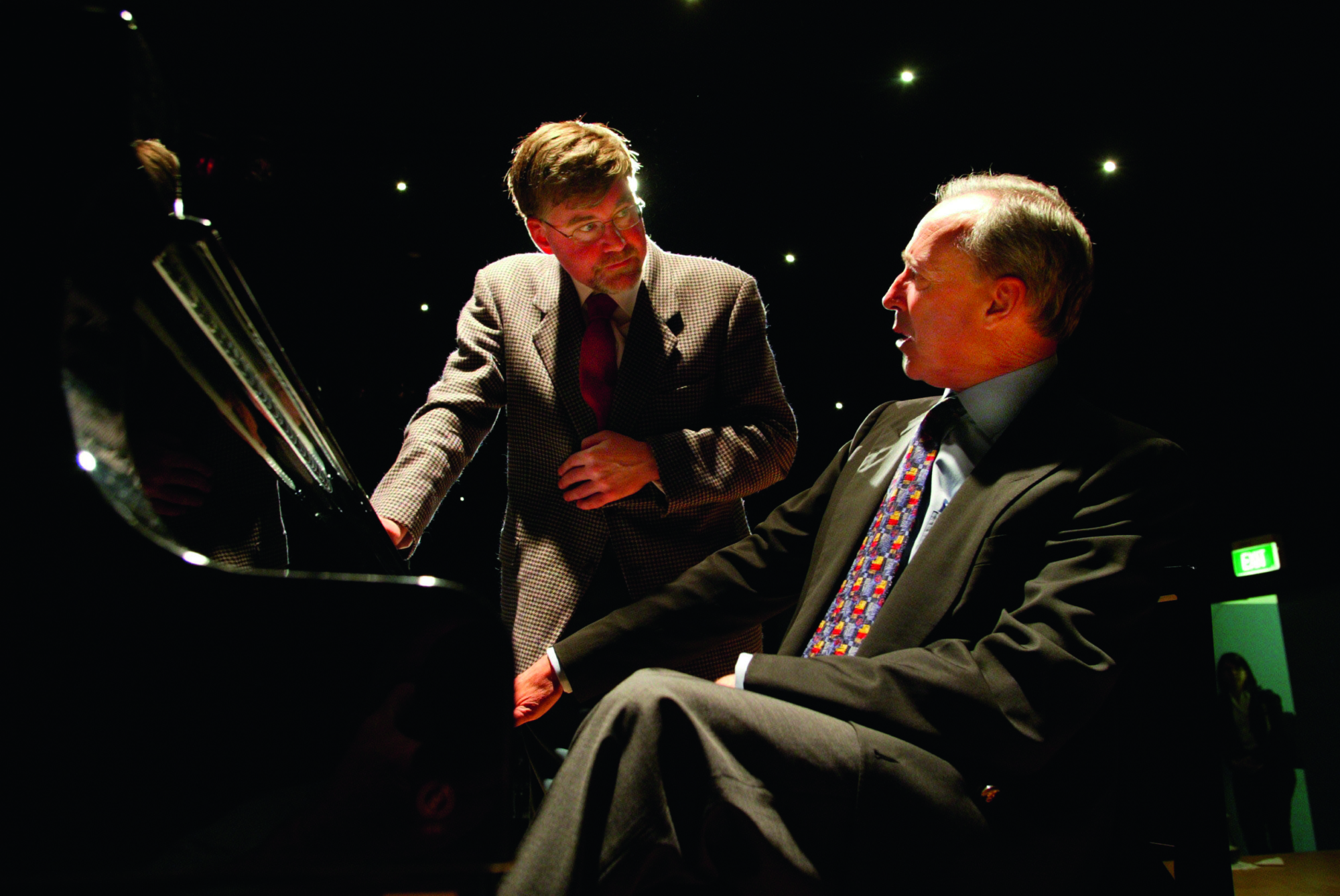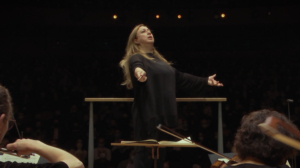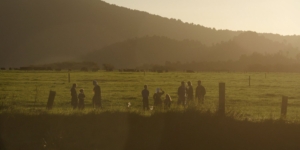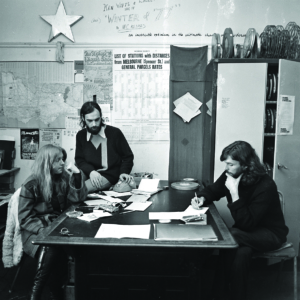It feels like there’s more than one legacy at stake in The Eulogy (2018), Janine Hosking’s documentary about Geoffrey Tozer. Most immediately, the film aims to bring the life, work and legacy of the Australian pianist and composer – whom it largely presents as being unfairly neglected by the local arts scene despite his numerous accomplishments – back into the public consciousness. But The Eulogy also draws heavily on the connection of former prime minister Paul Keating to Tozer, particularly in the form of the titular forty-five-minute eulogy that he delivered at Tozer’s funeral in October 2009.[1]The full eulogy is available at ‘The Honourable Paul Keating’s Eulogy to Geoffrey Tozer’, The Eulogy official website, <http://theeulogy.com.au/tozer-eulogy>, accessed 23 May 2019. Added to this is the on-screen guiding presence of celebrated Australian conductor and music educator Richard Gill, who died in October 2018.
Hosking explicitly asks us to consider the question ‘What went wrong?’ with regard to Tozer’s life and career; after all, he was, Keating reminds us, ‘quickly dubbed a “musical genius” by Australia’s foremost musicians’ as a young boy. Yet we’re also left to ponder for ourselves the associated question of exactly how and why we should value someone like Tozer, who was certainly an extraordinarily talented artist. And we’re left to ponder for ourselves exactly how and why we should value the music he created – a question that we may delude ourselves, when we’re not directly faced with it, into thinking is obvious.
The elusiveness of grasping the notion of musical ‘genius’ is what makes The Eulogy intriguing beyond straightforward biography, even as it perhaps fails to fully reckon with this difficult underlying problem. Its primary subject, Tozer, is captured with vivid affection and interest, alongside excellent archival research and commentary by Gill. But it’s the music itself – what it is and how we should respond to it – and the indeterminate idea of genius that are never quite defined or presented for direct consideration. We’re told regularly by many interviewees just how good Tozer was, but the film rarely puts us in a position to comprehend what that actually means for the musician or for his appreciators.

As Gill leads us through elements of the pianist’s life, Tozer and Keating’s combined presence also summons a tension between politics and music. It’s another connection that Hosking likewise never quite explores with the nuance it demands, which leaves The Eulogy with a number of unexplored threads relating to class, cultural capital and the funding of the arts – both then and now – that unavoidably appear one way or another when considering an Australian Labor Party (ALP) prime minister’s fierce public and financial advocacy for a classical musician. It may be for the best that the film doesn’t stray too overtly into this area – The Eulogy is, after all, primarily about Tozer himself and needn’t necessarily engage with a larger argument. Nevertheless, it’s Keating’s eulogy that frames the portrait of Tozer that’s presented here, and that brings with it a number of resonances that are sometimes redirected rather than considered in all of their muddy social and cultural complexities.
Similarly, Tozer’s musical talent is something that the film isn’t quite able to wrest away from being an abstract concept that’s tangled up in hagiographic storytelling. We’re confronted with the disconnect between Tozer’s evident talent and his lack of reputation in the contemporary Australian arts scene, but it’s difficult to really know what to make of this, especially in an era when the idea of ‘genius’ is not necessarily particularly potent.[2]See, for example, Joshua Wolf Shenk, ‘The End of “Genius”’, The New York Times, 19 July 2014, <https://www.nytimes.com/2014/07/20/opinion/sunday/the-end-of-genius.html>, accessed 23 May 2019.
Surprisingly, Keating’s eulogy offers little to help us understand his elevation of Tozer’s status. The speech – or, at least, what we see of it in the film (as re-enacted by Keating) – focuses heavily on the Australian arts community’s neglect of Tozer and his music. As well as being largely without political content, it’s without the sense of wit that Keating is often best remembered for. What we see and hear of the eulogy is aggressive without being cutting, and angry without being evocative. Lines like ‘the bitchiness and preference within the Australian arts’ – which is given particular emphasis immediately before the film’s title and repeated later – suggest a benefactor’s anger, not insightful cultural and artistic revelation, and there’s little to assist the unfamiliar to truly appreciate what elevates technical prowess to the level of genius. Those who were not already familiar with Keating’s eulogy may, rather than being impressed by its impassioned nature, be turned off by the vitriol hurled at vague targets.

The film’s use of Keating also feels cautious rather than probing. The former prime minister admits that Tozer ‘was the inspiration for’ the Australian Artists Creative Fellowships, which the pianist was awarded twice; this, unsurprisingly, resulted in questions from political opponents and others about Keating’s influence and motivation. The Eulogy directly acknowledges the criticisms – we’re assured by interviewees that the doubled awarding of the grant to Tozer had nothing to do with any intervention from Keating – but the matter is then brushed aside with disconcerting speed. Whether or not the controversy is worth revisiting is up to individual viewers. For me, however, it proved topical for a different reason: around the time I caught The Eulogy at the 2018 Adelaide Film Festival, the Coalition government had been embroiled in its own controversy over the independence – or seeming lack of independence – of the ABC.[3]See Sinddy Ealy, ‘The Coalition Wants the ABC Furore to Blow Over, but Its Fingerprints Are All over This Mess’, The Guardian, 2 October 2018, <https://www.theguardian.com/commentisfree/2018/oct/02/the-coalition-wants-the-abc-furore-to-blow-over-but-its-fingerprints-are-all-over-this-mess>, accessed 23 May 2019. Yet influence in policymaking contexts is far more complex than whether or not a specific someone specifically told someone else to do a specific something, so this section may feel, on the whole, like a frustrating sidestep – even to viewers who are reluctant to give any retrospective endorsement to such decades-old attacks on Keating.
We’re confronted with the disconnect between Tozer’s evident talent and his lack of reputation in the contemporary Australian arts scene, but it’s difficult to really know what to make of this, especially in an era when the idea of ‘genius’ is not necessarily particularly potent.
This may also ultimately do little for Keating’s reputation among younger, unfamiliar or more progressive viewers, as a shift against the neoliberalism ingrained in supposedly leftist factions gains momentum[4]See, for example, Greg Jericho, ‘Flogging the Dead Horse of Neoliberalism Isn’t Going to Improve the Economy’, The Guardian, 2 April 2017, <https://www.theguardian.com/business/grogonomics/2017/apr/02/flogging-the-dead-horse-of-neoliberalism-isnt-going-to-improve-the-economy>; Jeremy Poxon, ‘It’s Time for Progressives to Move On from Paul Keating’, Crikey, 1 March 2019, <https://www.crikey.com.au/2019/03/01/paul-keating-progressives/>; and Jeff Sparrow, ‘The Liberal Left Is Trapped in a Death Spiral: Progressives Need to Throw the Reset Switch’, The Guardian, 29 June 2016, <https://www.theguardian.com/commentisfree/2016/jun/29/the-liberal-left-is-trapped-in-a-death-spiral-progressives-need-to-throw-the-reset-switch>, all accessed 23 May 2019. and various legacies of Keating’s remain open to question.[5]See, for example, Antony Loewenstein, ‘Media War Junkies Unite’, in Loewenstein & Jeff Sparrow (eds), Left Turn: Political Essays for the New Left, Melbourne University Press, Carlton, VIC, 2012, pp. 78–9; and Nick Baker, ‘A History of Australia’s Offshore Detention Policy’, SBS News, updated 20 February 2019, <https://www.sbs.com.au/news/a-history-of-australia-s-offshore-detention-policy>, accessed 23 May 2019. Tethering Tozer to Keating may see the musician’s legacy drifting further away, along with the politician’s.
So what are we left to make of Tozer’s music – and his apparent genius – in the midst of all of this? To declare genius is not the same as demonstrating it. Perhaps genius by its nature can’t be demonstrated; at least, those who embrace the idea of genius might suggest so. In any case, a viewer unacquainted with Tozer will largely have to take Keating’s and the interviewees’ word for it. At times, the film just seems to paint Tozer as an immensely talented man who achieved a great deal while facing numerous problems in his life – not exactly a unique situation among creatives – but who also happened to have a supporter in an extremely high place to insist on his prominence. Precisely what makes him a genius, or even someone worthy of Keating’s aggressive eulogy and of being plucked from the apparent indignity (in Keating’s view) of a part-time teaching job and riding a bicycle to work, is less clear.
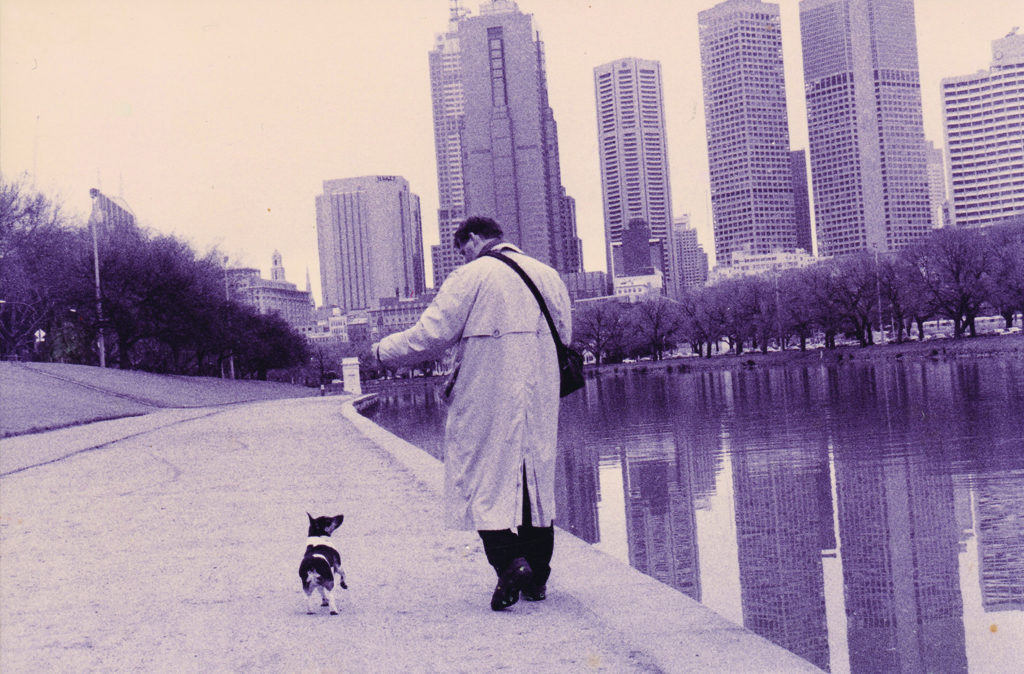
As for Tozer’s music, there’s little about it in the film, even if we do hear a lot of it – discussion of his achievements, yes; clips of him performing and recorded music on the soundtrack, yes; but not any real attention on the music itself. Tozer’s work peppers the film, but Hosking neglects to clarify for an unfamiliar viewer (which, by the film’s underlying logic, most of the audience will be) what makes it truly special. With so much classical music relegated to being generic filler in modern culture, and with a concomitant over-reliance on background scoring in film, simply having Tozer on the soundtrack isn’t enough to address this shortcoming. Certainly, Gill, who was himself apparently not overly familiar with Tozer when the project began,[6]See ‘Q&A with The Eulogy Director Janine Hosking’, Melbourne International Film Festival website, 13 July 2018, <http://miff.com.au/blog/story/qa-with-theeulogy-director-janine-hosking>, accessed 23 May 2019. takes some steps towards engaging more deeply with the music – but the arduous feat he’s attempting of transferring, or even just communicating, the experience of appreciating art can’t help but come up short.
These steps may, in fact, be The Eulogy’s most awkward moments. In some scenes, Gill stands in front of a contrived classroom of young music students who, with dutiful reverence, respond to questions about Tozer’s talent and abandonment by Australia’s arts scene. In another, we’re brought to a room in Benedict House in Queanbeyan, New South Wales, where Tozer lived after his first fellowship; here, Gill sits alone (save for a camera or two), listening for the first time to a recording of Tozer playing Nikolai Medtner’s Piano Concerto No. 1. For Gill, it’s an ‘amazing revelation’, and the scene is an effective conceit – but it ultimately brings the uninitiated no closer to apprehending what is quite so ‘spectacularly brilliant’ about Tozer’s recording. Although it plays behind the visuals and narration, we’re not placed in a position to truly listen to the performance ourselves. We’re left with another ‘trust me’ moment: authentic, perhaps, and sincere, no doubt, though one that can’t help but fail when it comes to communicating what the music itself carries within it.
To declare genius is not the same as demonstrating it. Perhaps genius by its nature can’t be demonstrated … In any case, a viewer unacquainted with Tozer will largely have to take Keating’s and the interviewees’ word for it.
Some of the overall evasiveness in connection with larger ideas may stem from the fact that The Eulogy relies on a fairly standardised documentary structure that centres on unexpected developments at key narrative points to reshape an audience’s understanding of the subject. It’s a format dependent on delayed revelation, presenting core details as structural turning points rather than trying to tackle all the muddied complexities head-on. It’s difficult to avoid the slight sense that this structure too strongly serves the film rather than its subject. Some notable aspects of Tozer’s life that are withheld in The Eulogy’s earlier passages seem to be presented as complicating moments, but are, in essence, fairly unsurprising: the difficulties he encounters as a professional musician, for instance, are hardly unexpected but aren’t directly addressed until much later. Similarly, the discussions around Tozer’s sexual orientation lose potency, as they, too, happen towards the film’s conclusion. This isn’t, of course, to suggest that the film’s makers have any intention of avoiding or downplaying Tozer’s sexuality. The negative feelings towards Tozer’s partner displayed by a number of Tozer’s friends are perhaps the most harrowing, and moving, of the film. These scenes’ delayed appearance also reflects The Eulogy’s largely chronological approach, and offers the additional – and unhappy – suggestion that Tozer may have encountered love only in old age. At the same time, broaching sexuality earlier, as a central element of Tozer’s identity and art, might have been more illuminating. It is not unreasonable to wonder whether the framing of his sexuality as a late-narrative development has been unconsciously inherited from cinema’s wider heteronormative penchant for deploying orientation as a ‘twist’ to escalate the stakes.
While The Eulogy comes up short when grappling with some of its underlying tensions (in Tozer’s life; between art and politics), it should nevertheless be viewed as a clear success in terms of historical research and accessible biographical filmmaking. The complexities of the ideas it engages with may often be lost amid its streamlined structure, overly literalised or soft-pedalled, but this also gives the sense of a subject who is more complex than the personal and professional details that could be contained within a single film. Moreover, Hosking has contributed not only an account of a life full of achievements and contradictions, but also to our understanding of a time in Australian history that’s quickly slipping from the edges of the ‘recent’ and into the outskirts of ‘historical’. The Eulogy remains an intriguing document of a remarkable Australian figure – even if the idea of musical genius still seems as distant as ever, and we’re ultimately left with the sense that, no matter who delivers the eulogy, some legacies linger and some simply fade away.
Endnotes
| 1 | The full eulogy is available at ‘The Honourable Paul Keating’s Eulogy to Geoffrey Tozer’, The Eulogy official website, <http://theeulogy.com.au/tozer-eulogy>, accessed 23 May 2019. |
|---|---|
| 2 | See, for example, Joshua Wolf Shenk, ‘The End of “Genius”’, The New York Times, 19 July 2014, <https://www.nytimes.com/2014/07/20/opinion/sunday/the-end-of-genius.html>, accessed 23 May 2019. |
| 3 | See Sinddy Ealy, ‘The Coalition Wants the ABC Furore to Blow Over, but Its Fingerprints Are All over This Mess’, The Guardian, 2 October 2018, <https://www.theguardian.com/commentisfree/2018/oct/02/the-coalition-wants-the-abc-furore-to-blow-over-but-its-fingerprints-are-all-over-this-mess>, accessed 23 May 2019. |
| 4 | See, for example, Greg Jericho, ‘Flogging the Dead Horse of Neoliberalism Isn’t Going to Improve the Economy’, The Guardian, 2 April 2017, <https://www.theguardian.com/business/grogonomics/2017/apr/02/flogging-the-dead-horse-of-neoliberalism-isnt-going-to-improve-the-economy>; Jeremy Poxon, ‘It’s Time for Progressives to Move On from Paul Keating’, Crikey, 1 March 2019, <https://www.crikey.com.au/2019/03/01/paul-keating-progressives/>; and Jeff Sparrow, ‘The Liberal Left Is Trapped in a Death Spiral: Progressives Need to Throw the Reset Switch’, The Guardian, 29 June 2016, <https://www.theguardian.com/commentisfree/2016/jun/29/the-liberal-left-is-trapped-in-a-death-spiral-progressives-need-to-throw-the-reset-switch>, all accessed 23 May 2019. |
| 5 | See, for example, Antony Loewenstein, ‘Media War Junkies Unite’, in Loewenstein & Jeff Sparrow (eds), Left Turn: Political Essays for the New Left, Melbourne University Press, Carlton, VIC, 2012, pp. 78–9; and Nick Baker, ‘A History of Australia’s Offshore Detention Policy’, SBS News, updated 20 February 2019, <https://www.sbs.com.au/news/a-history-of-australia-s-offshore-detention-policy>, accessed 23 May 2019. |
| 6 | See ‘Q&A with The Eulogy Director Janine Hosking’, Melbourne International Film Festival website, 13 July 2018, <http://miff.com.au/blog/story/qa-with-theeulogy-director-janine-hosking>, accessed 23 May 2019. |
